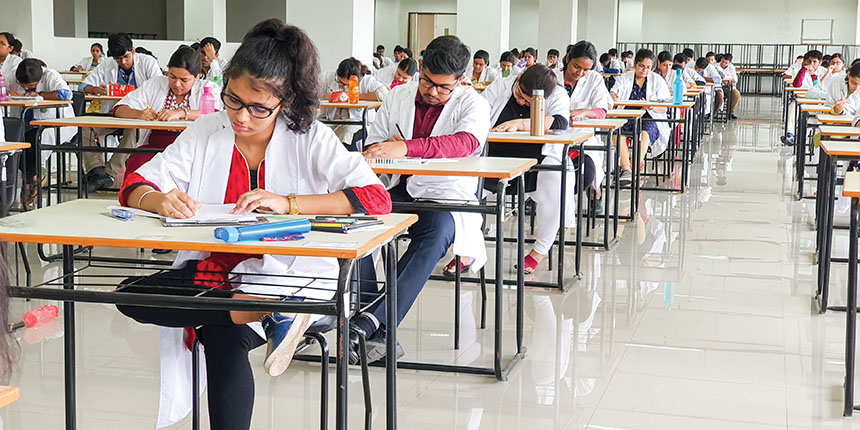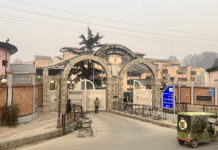by Pirzada Shakir
KUPWARA: After a long day of cleaning toilets, isolation wards in one of the frontier districts of Kashmir, Noor Jahan emerged all covered in filth. With no sufficient equipment to protect herself from the toxic gases and trash, Noor was light-headed as she pulled herself up. Minutes earlier, her naked hands retrieved a used glove covered in sludge.

As pots and pans banged loud from balconies to boost the morale of health workers, the work of sanitation workers is mostly unseen and unappreciated. They lack the status to fight for personal protection equipment and they work silently off the public gaze, mostly during early hours.
Noor Jahan, a West Bengal origin lady in her 50’s works in Kupwara’s Covid-19 hospital as a sanitation worker from dawn to dusk despite being strongly advised against by her neighbours. They fear the lady might get the infection with her and impact the locality.
Noor is married and settled in Drugmulla area of the district for the last 35-years. Her husband is unwell, not able to work and earn, thus putting the burden of feeding family on her shoulders. He has met with an accident some years ago in which he received spinal cord injury and is bedridden since then.
The lady lives in a makeshift house with her two daughters, two sons, and an old aged bedridden husband. She wakes up early in the morning, cooks food for the family, and gets ready to leave for the work at 8 am.
Frequent hartals (shutdowns) in Kashmir take a heavy toll on her. In absence of public transport she, sometimes, is forced to trek the distance on foot.
Though the government has drafted and issued an elaborate guideline for managing the Covid-19 hospital waste, not every place can handle it well, at least not Kupwara.
When asked, if she was afraid of putting her life at risk by working at the Covid-19 hospital, Noor said: “Sahab, Kaam Nahi Karengay Tou Khayengai Kya, Mera Patti Kayi Saaloun se Bemaar hai, Main Kaa’m nahi Karungi tou Bhook se Marna Hoga” (Sir, if I won’t work what will we eat? My husband is ailing for years; if I wouldn’t work we have to starve to death).
Noor maintains that she too wants to stay at home during this pandemic but her resource-less family forces her to work at the hospital to make the two ends meet. “I also see it an obligation to stand with our frontline workers in this fight against the novel infection,” she added.
Her neighbours have boycotted to visit her home. They have apprehension that she might be the carrier of the virus especially because she is not adequately protected.
“I face a social boycott from my neighbours for working at the hospital as they feel I would be carrying the infection. Their apprehension is genuine but they must understand if sanitation workers prefer to stay at home who will take care of sanitation of our surroundings and hospitals?” asks Jahan.
“Despite the risks and the dire conditions of our work, sanitation workers continue to do their job. You say that the work is dirty, but there is no dirty work, only dirty problems,” she adds.
Jahan admits that doctors, paramedics at the hospital treat her well that erases the haunting memories of her locality.

While struggling to keep the family intact, she has already sacrificed a lot. She has not been able to support the studies of her children. “My monthly income from the job is hard enough to arrange medicines for my ailing husband and food for the family,” she said.
“Safai Zaroori hai Corona se Bachne Ke liye,” (cleanliness is necessary to fight the Coronavirus), says Noor and stressed that we shouldn’t hate Covid-19 patient but should stand in support of them to fight it. “Our work contributes to society,” Noor said and added, “People do not recognize our contribution.”
From collecting trash contaminated with bodily fluids to discarded face masks, gloves, tissues, cotton swabs, syringes in addition to the sanitation of the hospital Noor does this all with other co-workers.
The sanitation work of the hospital was outsourced last year and was taken over by a local private contractor Mushtaq. “Noor is the most hardworking among all other workers working with us,” said Mushtaq.
Her 16-year-old son who was working at a bakery in his locality lost the job after Delhi unilaterally abrogated Article-370, bifurcated the state and reduced its status from a state to UT in August last year. The government enforced curfew and communication blockade for months in a row crippling the business sector of the erstwhile state that led to the loss of jobs in the private sector.
“As he was trying to find a new job to support the family once the situation started behaving normally, the Covid-19 pandemic shattered his dream of getting a job,” Noor further added.
Noor is just one of the thousands of municipal workers who keep Kashmir clean. Sanitation workers range from permanent public workers to private employees with no health benefits, pensions, and clear legal protections, to some of the most marginalized, poor, and abused members of society who take on low-grade, labour-intensive, and dangerous work at the other end. The work of informal sanitation workers is financially precarious, with poor pay and fewer benefits.
“I want people to appreciate us and what I want is a better living environment,” she said. “How can I be expected to improve my situation otherwise? How can my children be expected to have a better life than mine?”=
Kupwara falls at No 4 in the inter-district ranking within Jammu and Kashmir in the number of Covid-19 cases after Anantnag, Srinagar and Kulgam respectively. The number of positive cases detected in Kupwara is 331 out of which 234 are active and two died.
Pirzada Shakir is a freelance reporter based in Srinagar.















